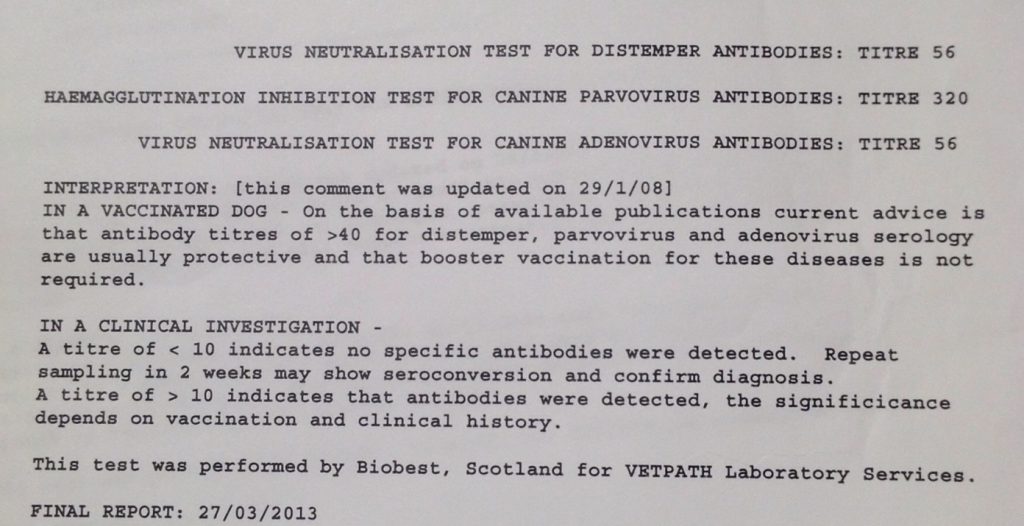

moosepup
-
Posts
9,084 -
Joined
-
Last visited
Posts posted by moosepup
-
-
Mine was the same, no confirmation but I rang them yesterday just to confirm as the first premium wasn't taken out of my account. :)
-
I've kept my PP cover just for the next month until the 30 day waiting period with BWM is over. Probably overly cautious but it would be just my luck for one of them to get ill. :laugh: Not technically out any money as my first month of BWM is free. :)
-
Hmm that sucks! I don't mind an increase each year which is typical of insurances but the ones they've had the last couple of years have been monumental. Hopefully the industry has stabilised a bit now.
-
BWM one month free code is available here, expires Jan 31
-
If you do decide to go with BWM google discount codes to get the first month free.
-
Gosh even if they do go up I'll be ahead of the game not being with PetPlan. $600 a year is a huge saving!
-
4darlingdogs - did you query the reason for the premium increase?
-
Okay just signed up for BWM. Moose was $41 and Nacho was $26!! I'll be saving $50 a month!

-
Sorry by coverage I just meant that BWM only covers up to $12k as opposed to PIA $15k. This isn't a huge financial issue for me though, I could absorb the difference if it came to it.
As there is a 30 day waiting period for illnesses, do you keep the old cover for 30 days?
-
Lol S_A, I just typed it up in Excel and took a screenshot. I need it all laid out to make sense. :laugh:
I think it's really important to go through the PDS with a fine tooth comb before signing up to make sure you're satisfied with what you're buying. I'm torn between BWM and PIA. I'd prefer BWM based on customer satisfaction and reviews but the policy coverage just isn't as good as PIA. What to doooo?
-
Great post S_A! I have spent most of the afternoon doing comparisons and this is what I came up with (Chihuahuas). I'm currently with Pet Plan but looking to change after the 50% premium increase last year. PIA is looking like a good option.

Has anyone that's changed policies applied to have the cruciate ligament 6 mth waiting period waived? Not sure whether to apply or just risk it.
-
I have another friend in a different council area that had to get the neighbours 2 houses either side to sign something and even though 1 complained she still got the permit. I guess they figure if it is only 1 person and everyone else says it is fine that it could just be a difficult or dog hating person.
I'm in WA but this is what happened to me. One neighbour objected (even though his dog is the worst!) but the council didn't particularly care. They just told him if he had an issue to keep a diary and make a formal complaint. They gave me a permit. :)
-
I prefer a slightly longer nose myself.
Moose and Nacho are both a bit of a combo, apple heads but longer noses.


-
I'm considering dumping Petplan now....my renewal isn't up until December 27 but I could save that money and we do have a credit card that is only used when we really need it (ie. when Cleo got sick we used it). Currently I pay $40 per dog, per month so it's not a huge amount but could make a difference.
I am so undecided, we could save that little bit extra per month or have a little bit of peace of mind (it's not total peace as stories of claims being rejected worry me).
I look at it from a worse case scenario perspective, say treatment costing $10'000 (let's presume the claim would be honoured).
1. Use a credit card and then spend years paying it back, with interest.
2. Put the $58/mth into a savings account in which case it would take me 14 years (essentially the lifetime of the dog) to save up to cover the treatment.
3. Pay insurance and not have to worry about the worst case scenario.
Options 1 and 2 require me to cover the whole 10k out of my own pocket. Option 3 means I don't have to pay anything out of my own pocket beyond premiums and excesses. Sure it's a pain that sometimes you end up paying premiums and never have to claim but I still think it's worth it, as much as it pains me!
-
I'm a bit put off BUT they do have the best coverage in the market, 100% payment for illness and injury plus lifetime cover for chronic illnesses. I guess you have to weigh up whether that's worth the higher premium.
-
I just had my policy renewal notice come through (after ringing and asking for it!) and both Moose and Nacho have gone from $40.65 to $58.39 each. I don't mind a premium increase but 50%!! Crikey moses.

Two Chihuahuas cost more for health insurance than I do. :laugh:

-
Depends Georgie, some are of the opinion that if they show positive antibodies than they should be covered for life. If you wanted to 'be sure' you could do it every 3 years in place of the triennial vaccination.
-
You're right teekay. I find the argument not to titre is just as flimsy as the argument for repeat vaccination over a dogs lifetime.
From the World Small Animal Veterinary Association.
Serological Testing to Determine the Duration of Immunity (DOI)Most vaccinated dogs will have a persistence of serum antibody (against core vaccine antigens) for many years. Immunologically, this antibody reflects the function of a distinct population of long-lived plasma cells (memory effector B cells). Induction of immunological memory is the primary objective of vaccination. For core vaccines there is excellent correlation between the presence of antibody and protective immunity and there is long DOI for these products. This correlation does not exist for many of the non- core vaccines and the DOI related to these products necessitates more frequent revaccination intervals.
Antibody tests can be used to demonstrate the DOI after vaccination with core vaccines. It is known that dogs often maintain protective antibody to CDV, CPV-2, CAV-1, and CAV-2 for three or more years and numerous experimental studies support this observation. Therefore, when antibody is absent (irrespective of the serological test used) the dog should be revaccinated unless there is a medical basis for not so doing. Antibody determinations to other vaccine components are of limited or no value because of the short time period these antibodies persist (e.g. Leptospira products) or the lack of correlation between serum antibody and protection (e.g. Leptospira or canine parainfluenza). Important considerations in performing antibody tests are the cost and the time to obtain results.
The VGG recognizes that at present such serological testing has limited availability and might be relatively expensive. However, the principles of ‘evidence-based veterinary medicine’ would dictate that testing for antibody status (for either pups or adult dogs) is a better practice than simply administering a vaccine booster on the basis that this should be ‘safe and cost less’. In response to these needs, more rapid, cost-effective tests are being developed.
[http://www.wsava.org/sites/default/files/VaccinationGuidelines2010.pdf
From the Australian Pesticides and Veterinary Medicines Authority
The APVMA supports the policy of the Australian Veterinary Association (AVA) (external site) and the position of the World Small Animal Veterinary Association (external site) who believe that vaccines should be administered on a needs-basis.http://www.apvma.gov.au/news_media/community/2010-07_vaccination_dogs_cats.php
-
Yep, I've had Hepatitis (Adenovirus) tested by VetPath. This is what you get...
My understanding is that Parvo is higher than Hep and Distemper as they're much more likely to have encountered it in the environment and thus the body will have a higher antibody count. H & D are fairly rare.

-
I've never had to pay a consultation fee, just the $60 for the test, depends I guess in whether you want the annual check etc or happy to just have the blood drawn and sent. I always let them know when I first enquire that they see their regular vet regularly and a full consult or check is not required. Will get back to you re the vets in North Sydney. How far are you from Russell Lea? there is a big all natural vet there, they were one of the first in Australia to start doing it. When you do get it done get them to request an actual value for immunity, not just the positive/negative that they have started to give vets. It tells you nothing really.
I haven't titre tested yet. Just so I understand...
I should expect to pay for the titre test only ($60) and not the consultation fee (usually $49)?
It's just that I can't imagine my vet not charging me for a consultation when I'd have to make an appointment, and have a consultation, to have the test done. Also, I remember reading somewhere that it costs more to have the titre test done with Vetpath if your vet hasn't set up an account with them.
Totally dependant on your vet I'd imagine. :)
Check when you're booking the appointment, just say you only require bloods drawn for a titre test and will it include a consult fee.
Last time I had the tests done (no consult fee) I paid:
$79 - Parvo only
$196 - Parvo, Distemper, Hepatitis
Prices have dropped since then though.
VetPath gives you an antibody value, not just a yes/no.
-
I'm not a vet, but I think it's fair to be skeptical of titering instead of vaccinating. "Correlation doesn't imply causation", and that's all we have with a titre - correlation. It does not measure immunity.
http://m.petmd.com/blogs/fullyvetted/2010/june/titering_or_vaccines-10182
Interesting article, thanks for sharing. :)
I'll still continue to titre instead of vaccinate as I consider my dogs' circumstances fairly low risk. Now if you could vaccinate against stick-fast fleas, I'd be all over that bad boy!
-
For sure westie, I just meant given the option between insurance and a credit card, a more expensive premium may still be your better option. :)
Haha who needs new floorboards when you've got a Mac dog? :D I'm sure he is worth every penny!
-
Plus the interest on a 9k credit card can very very quickly add up if you can't pay it off quickly.
-
Well that's the price the website quoted. The only difference is that I opted for a $500 excess to lower the premiums but it doesn't look like they give you that option anymore?? Who knows what they'll be!

Hollards Pet Insurance Quote Comparisons
in General Dog Discussion
Posted
Bonus. The CS yesterday was good too, only had to wait a couple of minutes and he was very friendly. I could also hear a dog barking in the background. :laugh:
The CS yesterday was good too, only had to wait a couple of minutes and he was very friendly. I could also hear a dog barking in the background. :laugh: